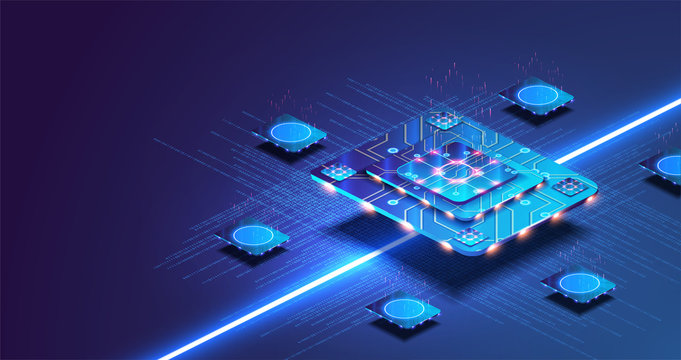Quantum computing in simple terms

Quantum computing is a type of computing that uses the principles of quantum mechanics to perform calculations much faster than classical computers. While classical computers use bits (0 or 1) to represent information, quantum computers use qubits, which can represent both 0 and 1 simultaneously. This property, known as superposition, allows quantum computers to explore many possibilities at once, making them potentially much more powerful than classical computers for certain types of problems.
The main purpose quantum computing
Factoring large numbers
It is a fundamental problem in cryptography. It involves breaking a large number down into its prime factors. While classical computers struggle to factor large numbers efficiently, quantum computers have the potential to do so much more quickly. This is because quantum algorithms can explore multiple possibilities simultaneously, making them more efficient at finding the factors of a large number. If quantum computers become powerful enough, they could potentially break current encryption methods that rely on the difficulty of factoring large numbers.
Optimizing complex problems
Quantum computing offers a potential breakthrough in solving complex optimization problems. By leveraging the principles of quantum mechanics, quantum computers can explore multiple solutions simultaneously, leading to faster and more efficient results. This could revolutionize fields like logistics, finance, and materials science, where finding optimal solutions to complex problems can significantly impact outcomes.
Machine learning
Quantum machine learning algorithms could potentially outperform classical machine learning algorithms on certain tasks, such as pattern recognition and classification.
The real application of quantum computing
Quantum computing is still a relatively new field, and its real-world applications are still being explored and developed. However, there are several potential areas where quantum computing could have a significant impact:
Materials Science
It has the potential to revolutionize materials science. By simulating complex molecular interactions and quantum phenomena, it can accelerate the discovery and design of new materials with tailored properties. This could lead to breakthroughs in fields like energy storage, drug development, and electronics. Quantum computers could help researchers explore materials at the atomic level, uncovering novel structures and properties that might be impossible to predict using classical methods.
Finance
The finance industry could undergo a transformation because to quantum computing. By leveraging its ability to process vast amounts of data and solve complex problems efficiently, quantum algorithms can improve risk assessment, portfolio optimization, and trading strategies. This could lead to more accurate predictions, reduced risk, and increased returns for financial institutions and investors alike.
Artificial Intelligence
Quantum computing has the potential to revolutionize artificial intelligence (AI) by offering significant speedups for certain AI tasks. Quantum algorithms can accelerate training of machine learning models, especially those dealing with large datasets or complex problems. Additionally, quantum computers can more efficiently simulate quantum systems, which could lead to breakthroughs in quantum machine learning. This intersection of quantum computing and AI holds promise for developing more powerful and innovative AI applications.
Advantages of quantum computing

Exponential Speedup
Quantum computers offer exponential speedup for certain types of problems compared to classical computers. This means they can solve these problems in a fraction of the time it would take a classical computer. This is due to their ability to exploit quantum phenomena like superposition and entanglement, allowing them to explore multiple solutions simultaneously. This exponential speedup has the potential to revolutionize fields like materials science, drug discovery, and cryptography.
New Applications
Quantum computing has the potential to enable entirely new applications and discoveries in various fields. For example, it could lead to the development of new materials with unique properties, accelerate drug discovery processes, and revolutionize artificial intelligence. Additionally, quantum computing could enable the simulation of complex quantum systems, providing insights into fundamental physics and chemistry that were previously inaccessible. These are just a few examples of the exciting new possibilities that quantum computing could unlock.
Advanced Simulations
Quantum computers can simulate quantum systems with unprecedented accuracy, providing insights into fundamental physics and chemistry that are beyond the reach of classical computers. This capability could lead to breakthroughs in materials science, drug discovery, and understanding complex quantum phenomena. For example, quantum simulations could help design new materials with specific properties or develop more efficient catalysts for chemical reactions.
Enhanced Problem-Solving
By addressing difficult problems that are now unsolvable for conventional computers, quantum computing holds the potential to completely transform problem-solving techniques. This involves solving intricate logistics network optimization problems, simulating quantum systems, and cracking specific cryptographic algorithms. These complicated problems can be solved more quickly and effectively thanks to quantum algorithms’ ability to investigate numerous solutions at once.
Improved Optimization
Quantum optimization algorithms can find optimal solutions to complex problems more efficiently than classical methods.
How quantum computing operates

Quantum computing operates by leveraging the principles of quantum mechanics to perform calculations much faster than classical computers. Instead of using bits (0 or 1) like classical computers, quantum computers use qubits, which can exist in multiple states simultaneously due to a property called superposition. This allows quantum computers to explore many possibilities at once, potentially solving complex problems much more efficiently than classical computers.
While the development of quantum computing is still in its early stages, the future looks promising. As researchers continue to overcome challenges such as qubit coherence and error correction, we can expect to see quantum computers making a significant impact on fields like materials science, drug discovery, artificial intelligence, and cryptography.
Is quantum computing part of AI?
Because quantum computing may accelerate certain AI processes exponentially, it holds great promise to greatly improve artificial intelligence (AI). Machine learning models can be trained more quickly with quantum algorithms, especially when they are working with huge datasets or challenging challenges. Furthermore, quantum machine learning may advance as a result of quantum computers’ increased ability to model quantum systems. AI and quantum computing together have the potential to create more potent and creative AI applications.
Can we buy quantum computer?
Yes, we can.These machines are extremely expensive, highly specialized, and require significant technical expertise to operate. Most quantum computers are currently owned by large corporations, research institutions, and governments, and are primarily used for research and development purposes. However, some companies offer cloud-based access to quantum computing power, allowing individuals and businesses to experiment with and utilize quantum computing without owning the physical hardware.
Future of quantum computing
The future of quantum computing is promising. As the technology continues to evolve, we can expect significant advancements in the following areas:
Increased qubit numbers and coherence
Increased qubit numbers and coherence are crucial for the future of quantum computing. More qubits allow for the exploration of a larger number of quantum states, enabling the solution of more complex problems. Longer coherence times reduce errors and improve the reliability of quantum computations. These advancements will be essential for realizing the full potential of quantum computers and unlocking their applications in various fields
Integration with classical computing
Together, quantum and classical computers can function in hybrid systems, leveraging their unique capabilities. While quantum computers are more adept at some quantum operations, classical computers are capable of handling tasks like data preparation, algorithm creation, and result analysis. This combination may hasten the advancement and practical use of quantum computing, resulting in more potent and adaptable solutions to challenging issues.
Error correction
Because qubits are sensitive and prone to error, error correction plays a vital role in quantum computing. To ensure the quality and dependability of quantum calculations, quantum error correction algorithms encrypt data over several qubits in order to identify and fix faults. This is crucial for creating useful quantum computers that can carry out difficult tasks with negligible error rates.
Conclusion
Quantum computing represents a revolutionary advancement in computing technology, offering the potential to solve complex problems that are intractable for classical computers. By leveraging the principles of quantum mechanics, quantum computers can explore multiple solutions simultaneously, leading to significant speedups